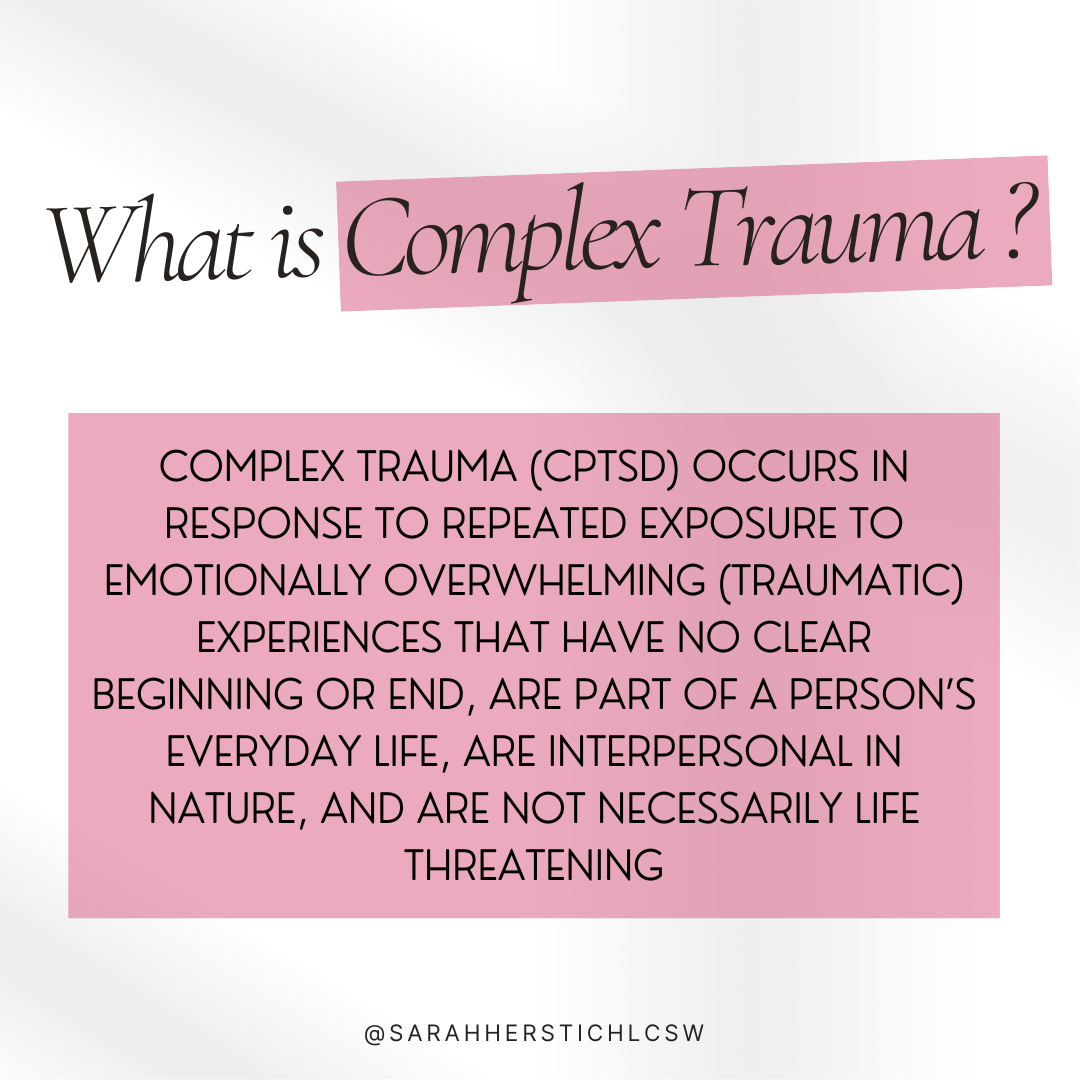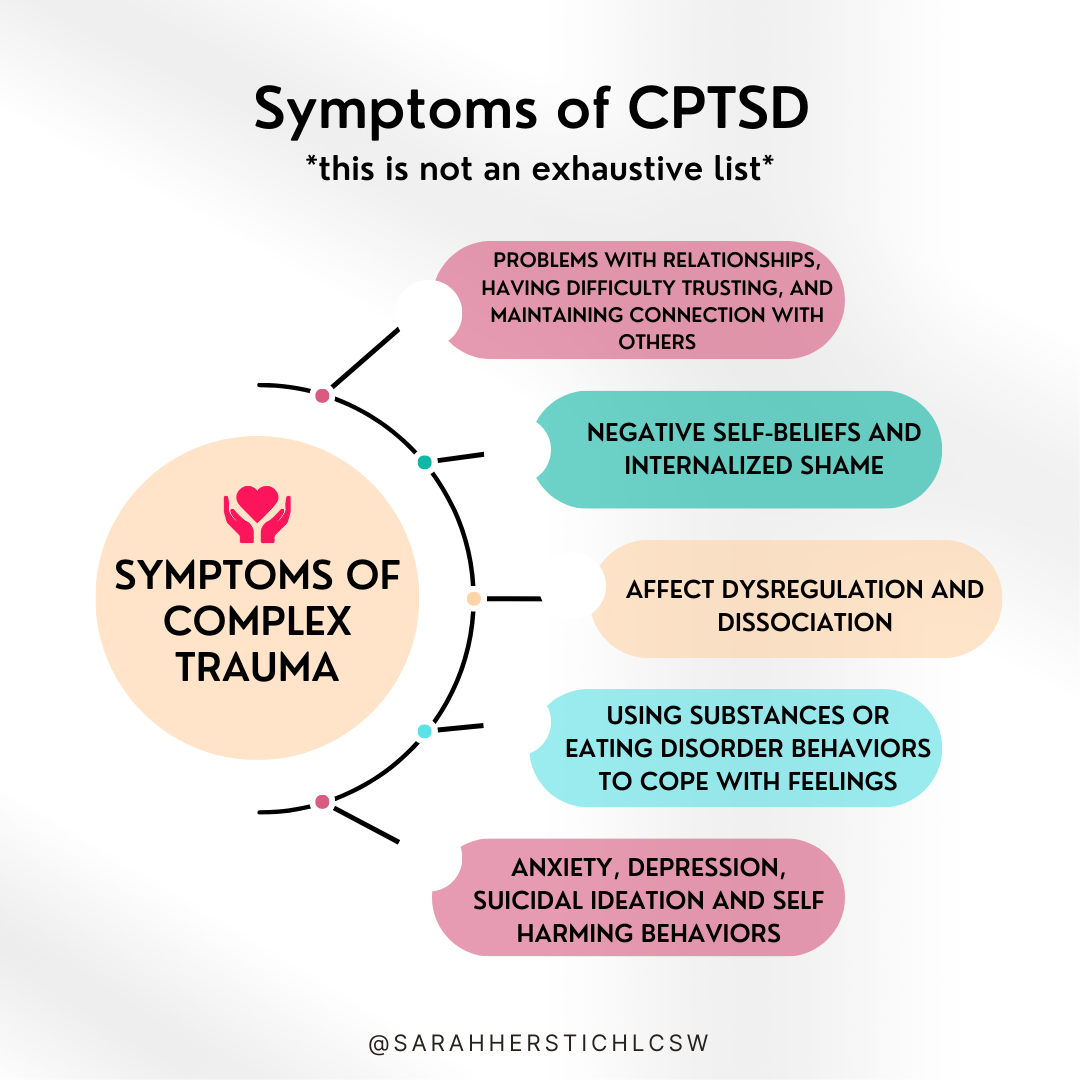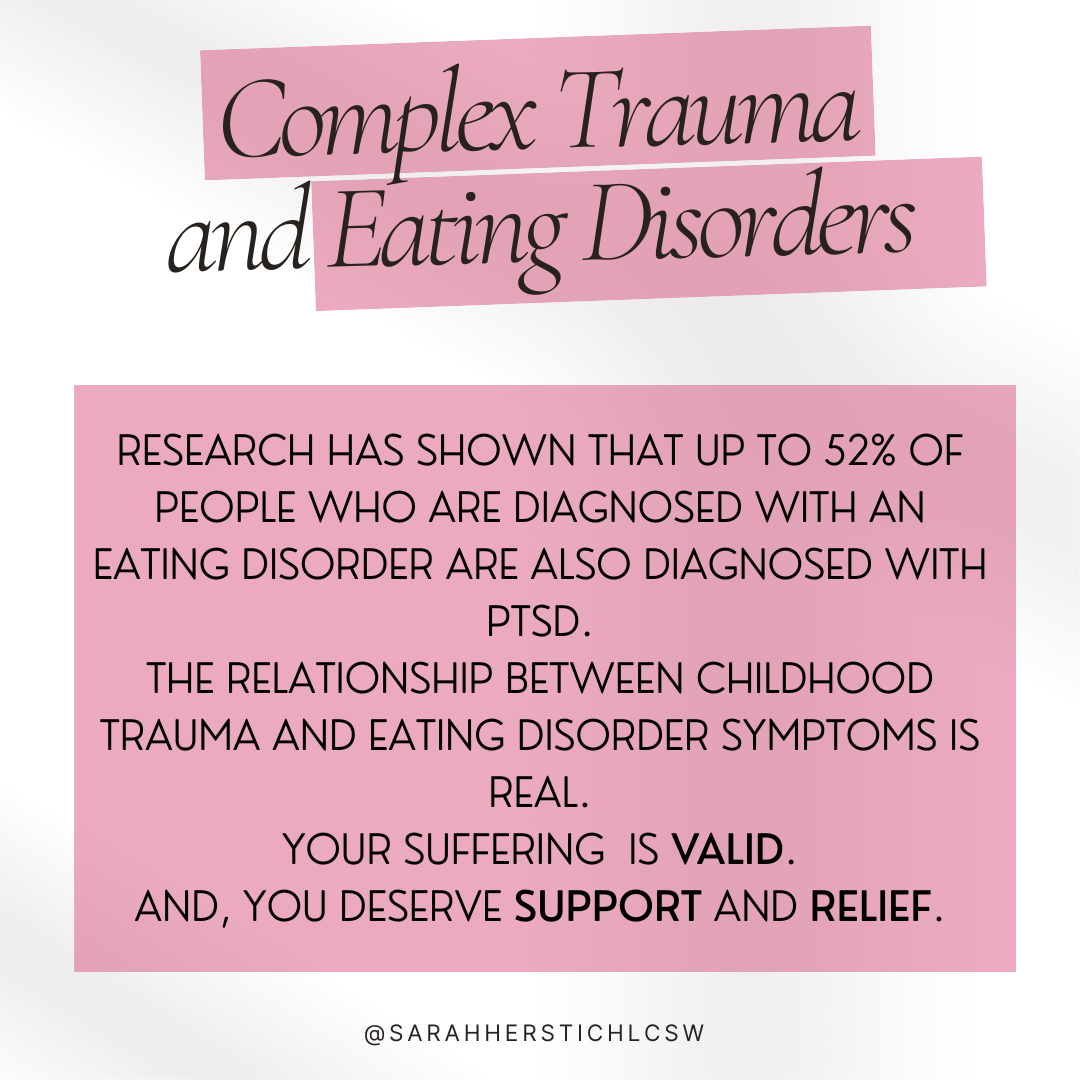What is Complex Trauma? (CPTSD) A Therapist Explains
A Guide to Managing Dissociation, Emotional Neglect, and Eating Disorders
What is Complex Trauma?
Complex trauma occurs in response to repeated exposure to emotionally overwhelming experiences that have no clear beginning or end, are part of a person’s everyday life, are interpersonal in nature, and are not necessarily life threatening.
Reclaim Therapy provides complex PTSD therapy in Pennsylvania.
A complex trauma CPTSD definition.
This complex trauma definition involves two distinct components of CPTSD including:
Childhood attachment failure, even in the absence of other forms of mistreatment
Ongoing relational maltreatment like neglect, verbal, emotional, sexual or physical abuse.
Outside of childhood experiences, CPTSD is also seen as a result of imprisonment, sex trafficking, torture or being exposed to long term conflict.
In last week’s blog, we outlined adverse childhood events (ACEs), what they are and why they matter. This is important in understanding CPTSD, because these experiences, which are often chronic and long lasting, can lead to CPTSD.
Complex Trauma Examples
CPTSD also has a strong association with the ongoing exposure to the following experiences in childhood, which are considered the Bermuda Triangle of childhood adversity:
Impaired caregiving due to mental health, substance abuse or criminal involvement
Witnessing family violence
Witnessing community violence
What Impact Do These Experiences Have on Children? And adults?
Children who experience secure attachment, consistent attunement and safety in their environment, often develop a secure sense of Self. This is shown through their ability to regulate their affect, connect and trust others and themselves, and feel safe in their environment.
As children we’re wired to turn toward our caregivers for attachment, attunement and protection.
When caregivers are the source of chronic overwhelming distress and/or fear, children are stuck in an impossible position; the biologically driven need for attachment to, and love from, those same caregivers who are harming, neglecting or misattuning to them.
When children experience this relational trauma, their neurobiology kicks in, leading them to operate out of survival responses (fight, flight, freeze, fawn). Because they cannot escape the environment (a child is fully dependent on caregivers) their neurobiological mechanisms protect them by employing survival strategies to escape in ways that feel safe in the moment.
This can result in children who experience trauma being unable to develop an organized and secure sense of Self to regulate emotions, trust, remain in the present moment and connect.
Strategies of survival can include disconnecting from themselves and their feelings (dissociation, freeze responses), rejecting and disconnecting from their needs, hypervigilance around hoping/wanting to please, working to receive love and affection through achievement, and feeling shame for having, or identifying, needs that may go unmet.
When secure attachment or attunement isn’t available, children often blame themselves for experiences they are living through, only increasing the experience of shame, self-rejection and self-loathing.
What we know is that children will do whatever it takes to stay attached to, and safe with, their caregivers the only way they know how- like holding onto secrets, feeling a deep sense of shame, attacking themselves or denying their lived experiences.
Because of this, beliefs like “I must have done something to deserve this” “I’m unloveable” or “I’m bad” “ can become a foundation of their core self beliefs.
When someone is seeking treatment for CPTSD, we often see these beliefs maintained throughout adulthood because of the way they were forced to organize, filter and respond to their childhood.
Complex trauma truly changes the way people feel, think and connect with themselves and others.
Your childhood bonds and safety in relationships echo throughout your life. They impact how you connect with other people, how you cope and how you care for yourself. The strategies that were used for survival as a child are often carried forward, shifting into new strategies to feel safe enough to engage in world, relationships and to remain disconnected or numb from feeling too deeply.
Symptoms of CPTSD
People with Complex trauma can experience a wide range of symptoms that can make their everyday lives very difficult. Many people don’t realize what a great impact their childhood had on their lives as adults.
CPTSD Symptoms Can include:
Problems with relationships, having difficulty trusting, and maintaining connection with others
Depression and anxiety
Affect dysregulation
Negative self-beliefs and internalized shame
Dissociation
Sleep problems
Suicidal ideation
Self-harming behaviors
Unexplained body aches and pains, including migraines, stomach and digestion troubles and arthritis
Type 2 Diabetes
Sexual problems
Low energy and fatigue
Problems protecting themselves from or in unhealthy or abusive relationships
Using substances or eating disorder behaviors to cope with feelings
Symptoms of Complex Trauma/CPTSD
Complex PTSD and Dissociation
One of the most challenging aspects of CPTSD is its close association with dissociation. When faced with overwhelming emotional pain, many individuals learn to dissociate as a means of self-preservation.
This can manifest as a sense of detachment from one’s emotions, memories, or even the physical world. While dissociation provides temporary relief, chronic dissociative patterns can interfere with the integration of traumatic memories and disrupt the development of a stable self-identity.
Complex PTSD Dissociation Treatment
In therapy, addressing dissociation is a critical component of the healing process. Clients are guided to gradually reconnect with their emotions and bodily sensations in a safe, supportive environment.
By learning strategies to stay present—such as grounding exercises and mindfulness practices—clients can begin to reintegrate their fragmented experiences, ultimately reducing the impact of trauma on their daily lives.
Emotional Neglect CPTSD
Emotional neglect is a particularly insidious form of trauma that often goes unnoticed because it leaves no visible scars. When caregivers consistently fail to provide emotional support, validation, or nurturing, children may grow up feeling fundamentally unworthy or invisible.
This lack of emotional attunement can lead to profound CPTSD symptoms, as the child internalizes a belief that their feelings and needs are unimportant.
Therapy for Emotional Neglect CPTSD
In therapy, addressing the impact of emotional neglect involves helping clients understand that their negative self-beliefs are not a reflection of their true worth, but rather a survival response to a deficient caregiving environment.
By fostering self-compassion and building healthier attachment patterns, individuals can begin to heal the deep-seated wounds left by emotional neglect, paving the way for more fulfilling relationships and a stronger sense of self.
The Connection Between CPTSD and Eating Disorders
The relationship between childhood trauma and eating disorders.
People how have experienced complex trauma often struggle with an overwhelming feeling of powerlessness due to what they have been through throughout their lives and being unable to prevent or escape from emotionally overwhelming situations and events.
The connection between CPTSD and Eating Disorders has been shown as people develop strategies of attempting to reassert control, or power, over their own body, to escape emotions or to reduce the awareness and/or pain of what they have been through.
Many people who have experienced complex trauma do not have access to a felt sense of safety- within themselves and within their environment. This can be transferred in feeling unsafe in their body, and engaging in eating disorder behaviors in attempt to find safety and regulation in a world that praises thinness.
Studies show that approximately 75% of women who have enrolled in residential treatment for their eating disorder have experiences trauma, and that 50% of them have a diagnosis of PTSD.
PTSD Eating Disorder Treatment
PTSD eating disorder treatment employs an integrated approach that targets both the underlying trauma—such as complex PTSD, dissociation, and emotional neglect—and the disordered eating behaviors used to cope with that pain.
By utilizing evidence-based therapies like CBT, EMDR, and mindfulness, this treatment helps clients rebuild a healthier relationship with food and their bodies, fostering emotional regulation and long-term recovery.
Treatment for CPTSD
Symptoms of complex trauma can be difficult to live with, but specialized CPTSD treatment in Pennsylvania is available.
Having a diagnosis for both Complex Trauma and an Eating Disorder is common.
Our trauma therapists will help you:
➝ Work toward finding internal and external safety
➝ Helping you manage the experience of feeling and the expression of feelings
➝ Understand your symptoms and what could be at the root of them
➝ Help you improve your relationships and relational skills so that you can more effectively manage your inner and external experiences and attachment
➝ Help you manage trauma-related symptoms including dissociation, nightmares, flashbacks and negative self-beliefs through modalities like ego-state work, IFS, somatic work and EMDR.
➝ Work through traumatic memories in a way that is meaningful for you, only when you are ready
➝ Honor your lived experience with compassion, understanding and the unwavering belief that you deserved different.
The therapists at Reclaim Therapy provide therapy for Complex PTSD (CPTSD).
We believe that you deserve trauma informed treatment that will support you in reaching your goals and living the life that you undeniably deserve.
🧡,
Looking for an eating disorder therapist or a trauma therapist in Pennsylvania?
Reclaim Therapy is a group of trauma-informed therapists who specialize in treating eating disorders, body image, binge eating and trauma. We provide in person session at our Horsham, PA office and online therapy in Pennsylvania. We are also able to work with people who live in West Virginia, Florida and Delaware.






